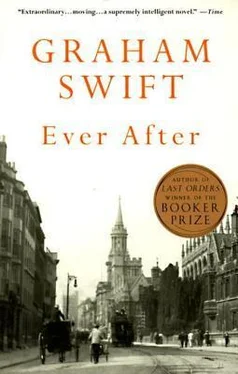Matthew says nothing. And John Pearce treads carefully. But remarkable recoveries — or rescues — happen. And Matthew has a capacity for happiness. And John Pearce is doubly glad that Rector Hunt should call that afternoon about his clock, and that he should bring his daughter with him.
Or that is how I like to see it. That is how I wish it to have happened. I give to Matthew’s life that very quality of benign design that he had already glimpsed might be lacking from the universe. I choose to believe that Matthew first met Elizabeth in his father’s office in Launceston that same July. And I choose to believe that at the very first meeting Matthew would have had the overwhelming perception that here, when his thoughts had already shown him how terribly you could go adrift, was the true, sure ground of his life. That he would have felt himself falling, sinking, collapsing again, not with that fearful sense of falling into a void, but with a sense of miraculous, restoring gravitation.
The scene: John Pearce’s workshop in Bell Street, Launceston. July sunshine — let’s suppose there was sunshine — slanting through the workshop windows on to the scratched and worn surfaces of the workbenches and on to the little brass pieces — cogs, springs, levers — laid out like some miniature treasury on rectangles of black felt. Matthew would have been impressed by the improvements to the workshop. His father now employed two journeymen and one apprentice, but he still sat, himself, at his workbench, eye-glass crammed into one eye, conforming to the image Matthew still retained of him from childhood: a vaguely magician-like figure, hunched over his little clockwork world, unwittingly miming the classic analogy for the existence of a Creator, and seeming to be engaged not only in the making of clocks but in the manufacture of this vital stuff called Time, this stuff which Matthew still thought of as being essentially human in meaning, the companion and guardian of human affairs.
A clock ticks on the mantelpiece.…
A desultory conversation in progress: Launceston gossip. John notes yet again the want of his son’s usual buoyancy and curiosity. Then the little bell in the office tinkles and John says, “Ah,” and drops his eyeglass neatly into his right hand, removes his apron, rolls down his sleeves and reaches for his jacket. “That will be Rector Hunt.”
Or perhaps there was nothing so apparently casual about this encounter. Perhaps John had said to Matthew: “The Reverend Hunt, from Burlford, will be calling by about his clock. He would be pleased to meet you.” Which is why Matthew was there. Or perhaps John, on a previous occasion, had said to the Rector, a man who, living in a household of women, felt a want of educated male conversation and a vague sense of being out of touch with the world, “Matthew will be home in July, so please call by — and you can see how the clock comes along.” But whether John had anticipated the Rector’s being accompanied by his elder daughter is another matter. And whether Rector Hunt had said to Elizabeth, “I shall be paying a call on Pearce the clockmaker — I believe his son, a Brasenose man, may be there. Perhaps you’d care to join me?” is another matter still. But why should Elizabeth have decided to attend her father about so humdrum a matter as a clock, when she might have passed her time in Launceston much more pleasurably, at the dressmaker’s or milliner’s, say?
Matthew would have gone with his father into the office, ready to offer his hand to Rector Hunt, but his eyes would have been compelled to meet first — and have been met quickly, meekly — by the eyes (I see them as glossy brown) of his daughter. A just-detectable hiatus would have occurred in which a just-detectable mutual blush would have touched the faces of the two young people. Then, after exchanged pleasantries and at a polite inquiry from the Rector and some prompting from his father, Matthew would have found himself rehearsing what he would have already rehearsed to his father, namely his account of the opening of the Bristol and Exeter Railway and of the jubilant arrival, just two months ago now, at the Exeter terminus of the first train from Paddington. And Rector Hunt and his daughter (if with different motives) would have listened with genuine awe to his tale. Railways existed, had existed for some thirty years in Cornwall — little, narrow-gauge haulage lines serving the north coast ports. But the Rector and his daughter would never have seen a steam engine. And these hurtling contraptions, which could take a man from his breakfast in London and set him down for dinner in Devon, they would have regarded with amazement and not a little dread.
Matthew does not overdo his scene-painting, but his voice betrays a curious urgency, and he finds himself gratified, peculiarly enlightened, by the looks of astonishment and vague fear on his listeners’ faces. As the train of his description is greeted by the cheering crowds at Exeter, a train of thought passes through his mind that fills him — he cannot say how much it has to do with Miss Hunt’s look of appealing vulnerability — with a sudden gush of liberating relief. The fear of the new, he thinks, is as primitive, as superstitious, as the fear of the old. We fear what we do not know. To the vole, the hawk is a monster of tearing beak and talons; only a man sees its aerial grace and skill. How many things that are dreadful to man might not be, in the eyes of their Maker, comely and fitting?
He moves with sudden confidence (John is amused to note how his son’s spirits are reviving) and with the aim of reassuring his audience, to give a practical and lucid account of that masterpiece of engineering, the steam locomotive, with a brief commentary on the dependability of Mr Brunel’s Broad Gauge. Elizabeth thinks: he has a way, to be sure, of making the extraordinary seem perfectly acceptable — and such a dependable, broad-gauge kind of smile. But the Rector, who cannot get beyond seeing a steam engine as a sort of tamed dragon and forgets that he has initiated the whole subject, says, “Yes — yes, indeed. But tell me, is that Philpott fellow still peddling Divinity at Brasenose?”
“But Papa,” protests Elizabeth, “you interrupt Mr Pearce.”
Matthew notices the swiftness of this intercession on his behalf and the briefest flash of a look from her (acknowledged by a reflexive tightening of the corner of his mouth) which seems to say, “See, I do this for you.”
“I’m sure”—she redeems any brusqueness with a smile—“he has so much more to tell us.”
And Matthew is only too conscious at this moment that he does, indeed, have other things to tell — he has seen stranger and more awesome things, indubitably, than railway locomotives. The possibility comes rushing to him that she might be the very one — the only one — that he might tell them to. But responding to the awkwardness of the situation (she notes: he is not clumsy, he has natural tact), he saves the Rector’s embarrassment—“No, indeed, I go on at too much length”—and, turning the conversation with a deferential inquiry about Rector Hunt’s own Oxford days (aware with the corner of his eyes how the corner of hers is twinkling; aware of how her father, almost unconsciously, takes her hand and strokes her wrist), allows a cheerful exchange of reminiscence about Oxford, or rather about two different Oxfords, which each pretends, for the sake of good feeling, are the same.
“No, no, Dean Philpott must have retired before my going up.”
“Ah, quite so. There would have been, I suppose, that man Newman.…”
And Elizabeth listens. And the Rector, on the verge of a theological disquisition, brings himself up suddenly with the remark (his turn for apology) that he has quite forgot the time and must be on his way. Whereupon Elizabeth says, and everyone laughs: “Indeed, Papa, you have quite forgot the time, for you have quite forgot the clock!”
Читать дальше












